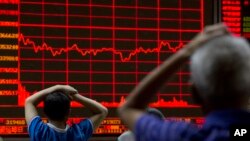Chinese state media announced a new round of confessions by people alleged to have spread online rumors of stock market irregularities Monday, following the arrest of nearly 200 people Saturday and Sunday.
Xinhua news reported the latest half-dozen people who face charges are: a journalist, an official with China’s securities regulator and four senior executives of local securities firms, all of whom have been placed under “criminal compulsory measures.”
That means they could remain detained indefinitely, be charged with a crime, or be placed under surveillance at home.
Massive crackdown
Before any convictions are reached, the massive crackdown has already demonstrated the government’s determination to keep the stock markets under control and restore confidence in the government’s bailout measures, said Oliver Rui, professor of finance and accounting at China Europe International Business School (CEIBS).
“The government clearly wants to send a very strong signal to the markets that, if anyone wants to be the enemy of the government, they will be punished eventually,” Rui said.
The authorities appear to have obtained hard evidence alleging the involvement of four securities executives – Xu Gang, Liu Wei, Fang Qingli and Chen Rongjie of Citic Securities – in insider-trading, as well as bribe-taking and forging official seals by the regulatory official, the professor said.
According to a statement released by the Ministry of Public Security, the journalist, Wang Xiaolu, a reporter of Caijing Magazine, confessed that he “had colluded with others and fabricated fake information” in a report published on July 20th about the Chinese Securities Regulatory Commission’s (CSRC) plan to withdraw government funds out of the stock markets.
The commission denied the report the next day, but it was convinced Wang’s report had triggered investor panic, which led to the stock markets’ 23 percent decline that week.
In the ministry statement, Wang is reported to have said he wrote the story based on hearsay and his own speculations without having had or verified the facts.
Professor Rui said he believes the journalist, whom he said showed poor professional judgment in not fact-checking sensitive information, should be cleared of insider-trading.
Confession concerns
In another confession reported by the ministry, CSRC official Liu Shufan also admitted wrongdoings, apparently saying he had taken advantage of his position to pull strings for publicly traded companies and accepted bribes worth millions of Chinese yuan.
Liu said he had further forged official seals to fake a court ruling on divorce and taxation certificates for his mistress, according to the public security ministry’s statement.
The swift release of such confessions, however, has raised concern about whether the accused have been treated fairly.
For example, the CSRC said last Friday that it has brought another 22 cases of insider-dealing to justice. But no similar confessions have been made public.
“Many have long expressed concern over whether China has followed due process in arrest and investigations. If the accused is coerced to make the confession, a fair trial is unlikely to be guaranteed,” said Zhang Qianfan, professor of Peking University Law School.
Officials and state-backed media have sternly warned against rumor-mongering, spreading fear that could cause further panic on the country’s shaky stock markets.
Online criticism
They have also cracked down on the heated online criticism that followed this month’s deadly blasts at the Tianjin port.
But Professor Zhang said that some of the arrests may not be appropriate, because the expression of comments online, especially those relating to the Tianjin blasts, can be immediately corrected to cause no substantial damages.
“The major principle [in handling online comments] is to see if such comments have triggered substantial harm, or imminent and inevitable damages. If not, no arrest should be made,” Zhang said, adding, “Even if rumors regarding the blasts in Tianjin were spread, the government shouldn’t have arrested anyone as long as it could find ways to correct them.”
In the case of media reports, Xu Huiming, an associate professor of journalism at Guangzhou University, argued that news organizations should oversee the quality of stories reported by journalists and, thus, should be largely held legally liable unless they have fully met their oversight obligations.
“While fulfilling reporting duties, no journalists should be held legally responsible alone even if the reporters are found to be lacking in professionalism. News organization should shoulder most of the liabilities,” Xu said.




